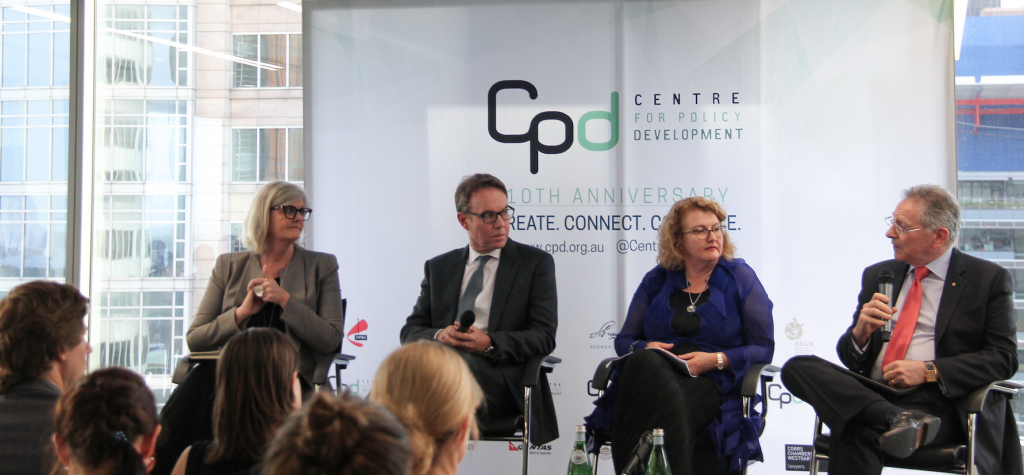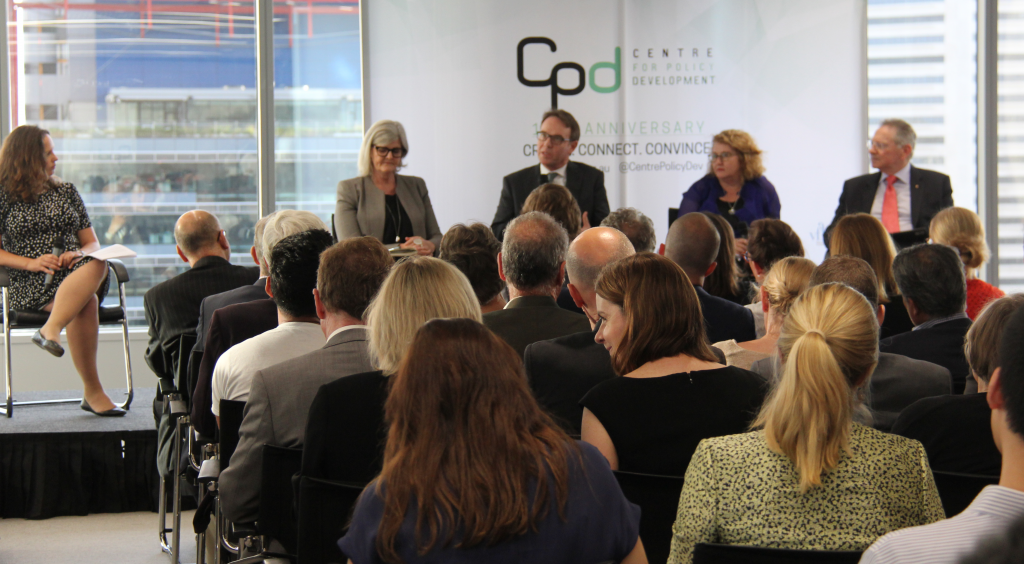
Sam Mostyn, Geoff Summerhayes, Christina Tonkin & Steven Skala.
On 29 November, CPD hosted the final event in our special 10th anniversary series – a public forum in Sydney on the theme ‘Building a sustainable economy.’
CPD’s Sustainable Economy Program focusses on the need to build a fair, sustainable and prosperous economy, including by properly considering the long-term drivers of risk, prosperity and wellbeing.
Some of the most pressing challenges involve preventing and responding to climate change. Last year we commissioned and released an influential legal opinion on company directors’ obligations to consider climate risk. In November 2017 we kicked off a new research stream with a discussion paper on how business and investors can go about scenario-based analysis of climate risks.
Our Building a Sustainable Economy event was a chance to reflect on these issues and broader challenges and opportunities around climate and sustainability. We were joined by four high-profile speakers with a unique perspective to provide on these issues:
- Geoff Summerhayes, Executive Member at APRA, gave a ground-breaking speech on the financial implications of climate change earlier this year – the first of its kind in Australia
- Christina Tonkin, Managing Director of Loans and Specialised Finance at ANZ, the first Australian bank to commit to climate disclosures in line with the new global Taskforce on Climate-related Financial Disclosures framework
- Steven Skala AO, newly appointed Chair of the Clean Energy Finance Corporation, the specialist clean energy financier established by the Australian government
- Sam Mostyn, a leading independent director and sustainability leader and member of the global Business and Sustainable Development Commission.
After providing some opening remarks, our speakers were joined by Bloomberg’s Emily Cadman for a panel discussion and Q&A. They spoke about climate and broader sustainability challenges – including the need to better understand the financial impacts of sustainability-related risks and opportunities; the growing importance of reputational risks and social license; the global relevance of the importance of the Sustainable Development Goals; and the important role business leaders can play by speaking out and supporting better policy responses to these long-term challenges.
Extracts from our speakers prepared remarks are below, along with links to full versions and media coverage. A recording of the panel discussion and Q&A will be available shortly.
CPD would like to thank Sarah Barker, Maged Girgis and the team at MinterEllison for hosting the event, and panellists who contributed to an engaged and candid discussion.
Media coverage
APRA quizzes financial sector over climate change risk preparations, Alice Uribe, Australian Financial Review
APRA stress tests for climate change, Michael Roddan, The Australian
APRA’s Summerhayes says weight of money now driving response to climate change, Peter Hannam, Sydney Morning Herald / The Age
Banks warned of regulatory action as climate change bites global economy, Michael Slezak, The Guardian
Banks and insurers must prepare for climate-related risks: APRA, Penny Timms, ABC Radio (Transcript here)
Key links
The weight of money: A business case for climate risk resilience, Geoff Summerhayes, 29 November 2017
Climate horizons: next steps for scenario analysis in Australia, Sam Hurley and Kate Mackenzie, CPD Discussion Paper, 28 November 2017
Final Recommendations Report, Task Force on Climate-related Financial Disclosures, June 2017
Key quotes and speech extracts
Geoff Summerhayes, APRA
“Shifts in market sentiment have increased the risk of asset value volatility, and the potential for stranded assets. Institutions that fail to adequately plan for this transition put their own futures in jeopardy, with subsequent consequences for their account holders, members or policyholders.
…the transition to a low carbon economy is underway, and that means the so-called transition risks are unavoidable: changes to market sentiment, new financial or environmental regulations, or the emergence of new technologies with the potential to prompt a reassessment of the value of a large range of assets, and consequently the value of capital and investments. But that doesn’t mean these risks are unmanageable, or that the impacts on businesses and the wider economy need be negative.”
“APRA supervisors have begun to ask questions of regulated entities. Initially, these have related primarily to awareness: is the entity aware of APRA’s comments about climate-related risks? Has it investigated or planned to investigate the issues raised? And if it has investigated them, is action required?”
“Increasingly, APRA will expect more sophisticated answers, especially from well-resourced and complex entities. As APRA identifies entities with better practices, we will further engage those institutions to gain a deeper understanding of how they approach, measure and manage these risks, and share this as industry guidance.”
“Externally, APRA has commenced discussions with Treasury, as well as fellow regulators ASIC and the RBA, on the sustainability and financial risk dimensions of the economy related to climate change. Through the creation of an interagency initiative, we intend to focus on information-sharing and improving our understanding in this area.”
Christina Tonkin, ANZ
“Our stakeholders are increasingly interested in a broader view – a more-holistic story about how we are creating value over time and the opportunities and challenges impacting our future.”
“We’ve been spending a lot of time reflecting on our purpose as an organisation, and how we can best use our skills, capabilities and relationships to have a positive impact. This inevitably means taking a stand on important issues – even when it comes at a cost… We want to be known as an organisation that shapes a future where people and communities thrive by helping to create a balanced, sustainable economy in which everyone can take part and build a better life.”
Steven Skala AO
“It is the view of our Board is that we must make each dollar go further, to have a much larger impact on decarbonising our economy, to further fill the gaps where it is needed. I can report to you that businesses have watched first movers in their industry cut costs and improve productivity using CEFC finance and are now coming to us to do the same.”
“Our objective is to continue to play a serious role in stimulating the reduction of carbon emissions, by ensuring the benefits of cleaner generation are delivered across the economy, alongside a much stronger focus on reduced energy consumption.”




